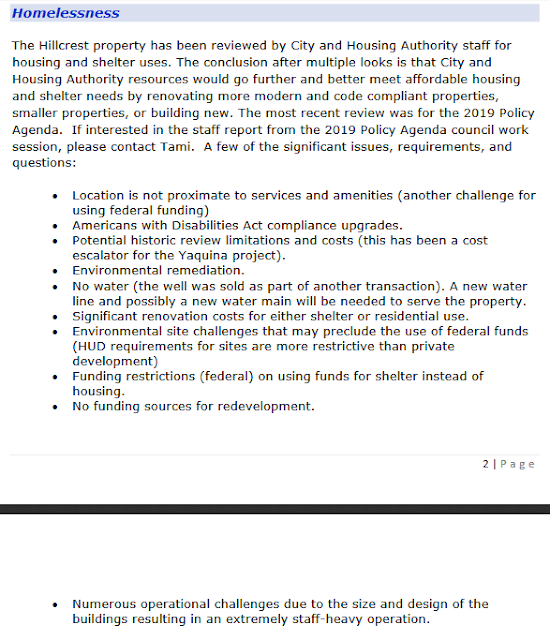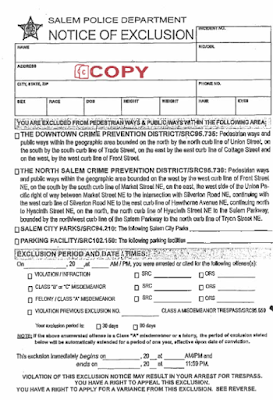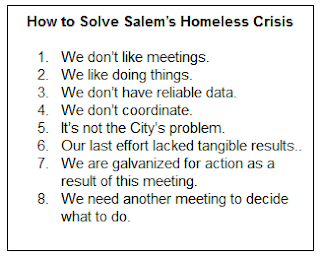By Sarah Owens and Michael Livingston
 |
| November 18 Work Session, from left: Councilors Ausec, Hoy, Nordyke, Lewis, Andersen and Kaser |
Support for the sit-lie portion of Ordinance Bill 10-19 dwindled to a minority of three -- Mayor Bennett, Councilor Nanke and Councilor Lewis -- following a work session that challenged City staff and Salem Police Chief Moore to explain why the City should ban sitting and lying on the sidewalks. Councilor Hoy indicated he can no longer support the sit-lie prohibition unless the civil exclusion penalty is removed.
Bennett opened the November 18 work session saying,"This is an opportunity to talk among ourselves, kinda see where we're headed on the sit-lie ordinance, this is an opportunity to take a look at this and figure out if you want to make any changes." He called on Urban Development Director Kristin Retherford for remarks.
Retherford related a brief history sit-lie in Salem, beginning with the failed passage in 2017, the appointment of the Downtown Homeless Solutions Task Force (DHSTF), the implementation of its recommendations, the continued complaints from downtown businesses and the redrafting in 2019, and ending with the forums.
The stated goal of the work session, Retherford said, was to discuss the ordinance and provide direction to staff about any revisions, e.g., the four listed in the staff report.
Hoy asked the first question. He wanted to know the reason for the lack of progress implementing the DHSTF recommendations. Retherford blamed the fact that both Union Gospel Mission and the Mid-Willamette Community Action Agency, with whom the City has chosen to partner for the purpose of implementation, had major construction projects. Hoy asked when The ARCHES Project's ten personal property storage units would come on line. Retherford replied "early spring."
Councilor Andersen asked how staff could conclude the DHSTF recommendations were ineffective and that sit-lie was necessary, given that the recommendations had not been fully implemented? Retherford explained that the DHSTF recommendations don't address "behavioral issues." Andersen observed that City code currently addresses a number of relevant behavioral issues, for example, disorderly conduct, and asked what behavior did sit-lie address? Moore replied that sit-lie addresses camping, erecting campsites and structures and abandoned property.
 |
| "It's all in the eye of the beholder." |
Continuing his list, Moore added, "some of the unsightly issues that you see, with people that have carts of, uhm, property that could be two to ten in a row, just abandoned property. [The ordinance] has to do with litter, garbage and some of those things that are left there. And of course the sit-lie would probably have more to do with, uh, behavior and uhm, the things that may, uhm, uh, have an impact on the livability more of the downtown than anything else."
Moore paused and said, "You know, being homeless is not a crime, and the sit-lie and anything that we put together isn't going to solve homelessness. But since we first introduced this [in 2017], we've continued to have concerns about behavior downtown. It could be anything from disturbances and trespassing and criminal mischief, and you're right, we have ordinances that address those things. But we don't have the ability to address, uhm, people that are laying on the ground, and uh, scattered with property, perhaps passed out, perhaps drunk, we don't have a drunk-in-public ordinance in the state, and so it deals more with conduct issues that aren't necessarily criminal behavior in all cases. Some it is criminal behavior, but we have to be present and able to see it before we can do anything to enforce it."
 |
| Bench at Court and Commercial Streets |
Nanke arrived late, around the time Andersen asked staff to rank the relative seriousness of the three problems the ordinance bill is intended to address-- camping, abandoned property and sit-lie. Retherford indicated that "the behavior piece and the property piece" together were the most serious, and gave as an example the City bench on the corner of Court and Commercial Streets which someone is using for storage, despite requests from the City to move the belongings somewhere else.
Andersen asked if the complaints were not about "visual issues" or "what it looks like downtown"? Retherford replied, "Looks like and smells like."
Moore said "It's all in the eye of the beholder...If you drive down Commercial Street, you think it's camping. If you happen to own a business, or go downtown shopping, you probably think it's people laying on the sidewalk drunk, maybe drug-induced, maybe emotionally disturbed, and the fact that they're allowed to stay there and act the way the do is concerning to many people, so ranking them is really difficult. I think it's all dependent on what your view of the world is and where you're coming from."
 |
| "Can the City prohibit public drunkenness?" |
Councilor Kaser asked if the City could prohibit public drunkenness, to which City Attorney Atchison answered no, such laws had been deemed unconstitutional. The Mayor asked about laws prohibiting vagrancy and loitering. Atchison informed him that Salem's vagrancy law (SRC 95.560 -- see
here) had been repealed, and its prohibitions on loitering applied only to minors (SRC 95.390 and 96.140) (but see
SRC 95.020, prohibiting "any person" from loitering in, on, around or about any stairway, aisle, hallway or any public place of business while drinking alcohol). Councilor Kaser asked if there were any laws prohibiting camping on parking strips and sidewalks. Moore said no.
Councilor Nordyke asked about people who'd been repeatedly arrested, wanting to know how effective that was. Moore said it wasn't, but the ordinance would "give an officer an opportunity to contact someone in the downtown area."
Now we can contact someone anytime, but they can tell us 'I don't want to talk to you, go away.' If we had an ordinance we would have a reason to contact someone, and the first thing we would do is to try and get them associated with some social services or some help that might stop that cycle [of arrests]...our officers hooking people up with services that might be of benefit to them, whether it's housing or alcohol or drug treatment, I think that's where we can make the difference, and I think this ordinance helps us do that.
Nordyke observed that there was nothing stopping providers and volunteers from offering services, and Moore agreed, adding that "the people we deal with downtown have been offered services over and over and over again, and they reject the opportunity to take advantage of them and that's why they are so difficult to deal with.
 |
| Complaints concern activity that's "already illegal." |
Nordyke asked Retherford whether the Downtown Clean Team was doing what it needs to do, given the volume of complaints? Retherford said the Team is staffed to funding capacity and doesn't clean private property (like doorway alcoves) or in the alleys, which are the subject of a lot of the complaints. Nordyke asked about implementing a CAHOOTS model crisis assistance team. Retherford said the Good Neighbor Partnership was looking at it, but, as with the sobering center, funding was an issue.
Hoy said he was concerned about "uneven enforcement" and there being additional penalties for offenses committed inside one of the Crime Prevention Districts. Moore agreed the difference was "unfortunate", but "if you're going to keep anything, an exclusion zone in the downtown area would probably be most effective because that's where ARCHES and the Gospel Mission is and the places that, for lack of a better term, draw more people. If you were to uncouple it, we would not be able to arrest for trespass."
Kaser asked whether enforcement of the camping ban and abandoned property provisions would be complaint driven? Moore said no, enforcement of the camping ban would be immediate (consistent with the notice provisions).
Andersen asked if there was "a certain percentage of people causing the problems." Moore responded by describing three groups of "homeless", those the police never have contact with, those who are "maybe passing through town and they take advantage of services...and move on," and those who are "service resistant" and
don't want to follow rules and regulations. They don't want to go places where they can't do drugs or drink or whatever, and I think those are the people we routinely deal with, who for three or four years we've gotten complaints about because we have no tools to change their behavior...and people are just tired of it. Those are the complaints and the calls that we get all the time.
Andersen asked if was true that neither the Downtown Homeless Solutions Task Force nor the Good Neighbor Partnership had endorsed sit-lie. Retherford said that's correct. Andersen asked Atchison about sit-lie's constitutionality. Atchison assured him it was.
Hoy said that local non-profits were making plans to implement a CAHOOTS model as a pilot.
Nordyke asked about "homelessness drifting into the neighborhoods" and parks as they are pushed away from downtown services. Moore said the "ordinance wasn't designed to push anyone out of anywhere" but to "better control behavior." He said camping activity in parks had "certainly increased over the years and it may just be a sign of the times. There are lots of homeless people."
Bennett asked for suggestions for staff to have ready for the first reading on November 25. Hoy said his goal was to come up with the "least burdensome ordinance that could still impact livability in the City," and he would support a proposal to "decouple" the civil exclusion provisions and change the hours from 7a to 7p. Andersen said his main concern was with the sit-lie portion, and he would like the option to have it removed. He also wanted to include a June 2020 sunset provision. Kaser said she would support removing the sit-lie portion and would consider a sunset provision. Lewis said he was concerned about "diluting the ordinance" but didn't have any suggestions on how to revise the bill. Nordyke said she didn't think sit-lie would address the vast majority of complaints she's hearing, which involve activity that's "already illegal" and "not improved by sit-lie." She had no suggestions for bill revisions. Councilors Ausec and Nanke, who had not spoken at all during the work session, also had no suggestions.
Kaser asked how soon would the ordinance take effect. Atchison said 30 days after second reading, "so, in December."






























